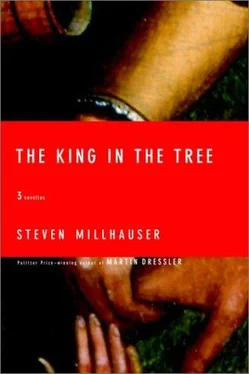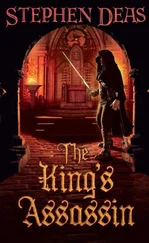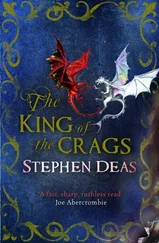Had she come to sleep in the open air because she was unable to sleep in the royal chamber? Had she escaped from the King, whose attentions repelled her? Perhaps she had had word from Tristan — at any moment he would leap over the wall and take her in his arms. Or had she, in her sorrow, sought out the place where she had once been happy?
I dared not move, for fear of waking her or alerting Brangane. Fortunately I am well-disciplined; as a young knight I trained my body to follow my will, and once forced myself to stand motionless in my uncle’s orchard from daybreak to sunset. Time passed, or ceased altogether. I had the sensation that I had been in the tree, guarding the Queen, not for this night only, but for many nights — for every night since the night I had seen her and Tristan walking in the moonlit orchard. I was startled, almost disappointed, when Brangane bent over and shook her awake.
She opened her eyes — I could see them opening, as if to gaze at me in my branches — then she sat up abruptly, held out her hand, and allowed Brangane to raise her to her feet.
“Quickly,” Brangane said, as she gathered up the coverlet and quilt.
“He will come,” the Queen said, quietly and sorrowfully.
They turned away, and I watched as they passed through the orchard and out of sight. For a long while I stayed in my tree, like a man bound in a spell. Then I climbed down and returned to the castle, even as the cocks began to crow in the courtyard.
The Queen goes out every night and waits for Tristan under the apple tree. The King cannot be ignorant of these journeys.
At this morning’s service in the chapel, the Queen rose from kneeling and, growing suddenly faint, stumbled for a moment against the King. The King, who had just risen, was startled by the sudden weight of the Queen against him, and would himself have stumbled and perhaps fallen had I not been able to support him with both hands. The King and Queen recovered at once. The episode lasted the space of a moment, but in my mind I see the three of us fixed in place as in a bas relief: the Queen fallen against the King, the King fallen against his old companion, who himself leans slightly away, his left hand grasping the King’s shoulder, his right hand gripping the King’s back, his neck tense, his lips pulled back over bared teeth.
This night I woke from a troubling dream of Tristan — he lay wounded and bleeding under a tree — and seemed to hear a sound coming from Tristan’s chamber. I sat up, listening intently. There could be no doubt: someone was stirring in Tristan’s chamber. I rose, put on my robes and sword belt, and stepped from my room to Tristan’s door, which was open a hand’s width.
When I entered his chamber I saw in the moon-streaked darkness a figure seated on the side of the bed, between drawn-back curtains. My heart leapt — he had come! — but at once I recognized the King.
“Is it you?” he said, in a voice so sorrowful that a heaviness came over me, and I could scarcely speak.
“It is Thomas, my lord.”
“Ah: Thomas. I thought—” He rose, in the dark. “I dislike empty rooms,” he said. “They remind me of—” He gestured with a hand, which dropped to his side. “I sometimes come in here, at night. I don’t know why. Do you remember when the three of us would ride out together? He was fifteen then. He could already cut up a buck like a man. His harp: the time he made the minstrel weep. Do you remember? I was— twenty-five. Twenty-five! God. Where has it gone? I never sleep. Do you sleep, Thomas? But of course you do. I keep thinking he’ll return, to ask my forgiveness. She doesn’t eat. She doesn’t speak. Let me show you something.”
He passed out the door and I followed him into the royal chamber. The shutters were unbarred and night brightness glowed in the room. He pulled aside the bed curtain and showed me the Queen, asleep on her side. I could scarcely see her in the darkness of the bed.
“Have you ever seen a more beautiful face?” the King asked, as he let the curtain drop back. “And yet—” Again that helpless gesture, the hand raised and falling to his side. “But I was going to show you—”
He pulled the curtain aside once more and bent over the Queen. As he gently began to draw down the coverlet, I did not know what to think. Was he going to show me the Queen’s nakedness? Then I saw a glint of something; her upper body was covered to the waist. He drew up the coverlet and led me to the door.
“It’s a shirt of iron. She has it from the chaplain. She wears it night and day. She is cut, bruised — all over.”
“But why—”
“At first I thought she was punishing herself because she had — dishonored me. But now I believe she is punishing herself because he is gone. She removes it if I ask her to. I am tired, Thomas.”
“Sleep, my lord.”
“Sleep? I’m done with sleep. Sleep is for the young. Sleep no longer desires me. Good night, Thomas.”
I left him standing at the door, like a knight whose task it was to guard the Queen’s sleep.
I do not like that iron shirt, cutting into the Queen’s flesh. Perhaps if I speak to the chaplain?
The King is mistaken about one thing: I too no longer sleep.
Today, after the tables were removed from the hall, a blind harper from Brittany played for us. I watched the King and Queen staring fiercely at him, trying to penetrate the disguise. Even I, who saw at once it was not Tristan, studied him closely, wondering whether I had perhaps been mistaken, whether he had deceived us by changing the shape of his body.
We are all waiting for him, the shining one.
If Tristan were to return now, and beg the King’s forgiveness, everything would be restored to him — except the Queen, except the Queen, except the Queen.
A week has passed, with little to report. The harper has left, one of the King’s favorite greyhounds has died, a group of six pilgrims have taken up residence in the guest quarters for a few days, a squire accused of striking a servant girl has been given a lashing. Oswin complains that the guests will exhaust the treasury; he reports expenditures for two dozen fowls, one hundred eggs, hay for six horses. Yesterday, in the royal forest, a boar gashed the thigh of the Baron Amaury de Chastelet.
An extraordinary thing has happened.
I went to bed early yesterday evening, after listening to a minstrel’s song of Charlemagne and Roland and then playing a game of chess with the King. On parting he spoke of the boar that had gored the baron, slitting him from his knee to his upper thigh; it occurred to me that the King’s thoughts were beginning to return to the hunt, a hopeful sign. In my bed I fell at once into a deep sleep and did not wake until dawn. As I woke I became aware of a coldness on my neck. At first I thought it was the chill morning air, but the sensation began to resemble a pressure, a weight of cold. When I reached up to touch my neck I felt a sudden sharp pain in the palm of my hand. I sat up quickly, fully awake, and saw a streak of blood on my palm. On the coverlet lay my dagger with the jeweled handle, which I had placed on Tristan’s neck under the pear tree in the Queen’s garden.
He was here! — I had no doubt it was Tristan who had placed it on my neck — and before descending to the chapel I stepped into his chamber and pulled aside the bed curtain, as if I might find him sleeping there.
In the chapel, kneeling beside the King, I observed the Queen closely. And now it seemed to me that a change had come over her, that her cheeks were slightly flushed, her lips less drawn, and that I had observed these changes, without thinking about them, for the past several days.
After breakfast I sent a message to Brangane, who met me in the King’s garden. On the turf bench beside the fountain of leopards I brought forth the dagger. She drew back — as though I had intended to murder her — but quickly recognized the weapon and its meaning.
Читать дальше












